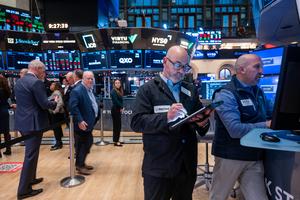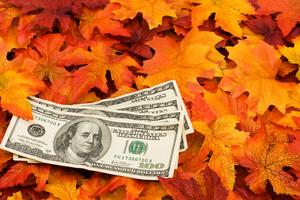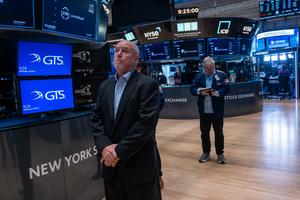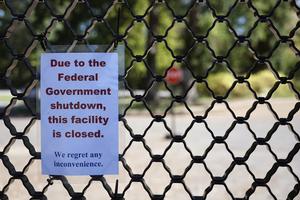Business
/ArcaMax

Jill On Money: Young grads feel the squeeze
With the Federal Reserve’s quarter-point interest rate cut behind us, it’s time to focus on the labor market. The Bureau of Labor Statistics (BLS) released a partial jobs report for October and a full one for November.
The results were mostly expected: 105,000 jobs were lost in October, primarily due to federal workers, who accepted ...Read more

Jill On Money: Your questions, answered
Time for another Q&A column! If you have a question, send an email to: askjill@jillonmoney.com.
Q: What is your opinion on saving apps, like Acorns and Robinhood? Are they a good way to save money?
A: I'm all in on anything that encourages you to save your money and get a jump start on retirement, and that includes where you bank and saving-...Read more

Jill On Money: Is the economy A-OK?
The U.S. economy is growing, and the stock market is up, so why are so many Americans feeling left behind?
“The economy looks better on paper, than in reality for many,” says Diane Swonk Chief Economist KPMG. In a recent interview that I conducted with her for my podcast, Swonk said what we are seeing is a K-shaped economy.
Here's how it ...Read more

Jill On Money: Giving thanks
Thanksgiving is my favorite holiday because it is a time when we can give thanks for all of the blessings in our lives, but there is no pressure around gifts, maybe just a little anxiety about putting the whole meal together — and of course, managing family drama.
This Thanksgiving, I am feeling especially grateful for you—the folks who ...Read more

Jill On Money: Changes to charitable giving
The charitable giving season is upon us and changes are afoot. While many people give because they want to do good, the tax rules around philanthropy have always been an added sweetener.
Although nothing has changed for 2025, the recently passed tax bill will usher in three major alterations to charitable giving in 2026, two of which limit the ...Read more

Jill On Money: Five stages of job loss
Amid the government shutdown, the first Friday of the month came and went without government jobs data. However, alternative measures of employment paint a picture of a labor market that is downshifting.
Outplacement firm Challenger, Gray and Christmas said announced layoffs jumped dramatically in October. “Some industries are correcting ...Read more

Jill On Money: Year end planning 2025
For some, the end of Halloween ushers in the holiday season. For personal finance nerds like me, it means that it’s time for year-end tax and financial planning. Because there are so many features of the Trump tax bill that take effect both this year and next, you may need a little extra time to develop a smart game plan.
Before we start, ...Read more

Jill On Money: Seniors get a 2026 raise
The lone economic report of Shutdown 2025 was released to great fanfare, but don’t get used to it. When the Bureau of Labor Statistics (BLS) announced the September Consumer Price Index (CPI), which was originally scheduled to be released on Oct 15, would be released on October 24, it also said that “no other releases will be rescheduled or ...Read more

Jill On Money: Estate planning cheat sheet
“You sure do like talking about death, Jill!” said one of my favorite producers. Unlike so many areas of our lives that are out of our control, planning for an event that has a 100 percent probability of occurring (our eventual demise) seems like a good task to tackle for all of us.
Yet, according to a recent study from Caring.com, we have ...Read more

Jill On Money: The great lock in
Every so often, there’s a new twist on an old financial planning idea. A recent example was the “FIRE” movement (“Financial independence, retire early”), which became mainstream in the early 2010s.
The idea behind it was to become an ultra-saver as soon as possible, in order to have more flexibility later in life. Peter Adeney, aka ...Read more

Jill On Money: Markets peak — Time to get out?
A friend recently contacted me asking whether I had time to review her investment accounts. She prefaced the meet-up with this note: "I'm waiting for the market to drop before putting my recent, big commission payment into the market."
This came within days of another message from a listener: "Should I do something with my 401(k) before the ...Read more

Jill On Money: Shutdown-o-nomics 2025
Once again, the U.S. government has shut down (since 1976, there have been 20). Beyond shuttered national parks and museums, there are plenty of direct and indirect financial consequences.
Here are the questions that I have been fielding:
Federal workers will bear the brunt of the stalemate. During the 2018-19 shutdown, which lasted 34 days, ...Read more

Jill On Money: Life insurance — the vegetable of your financial diet
September is Life Insurance Awareness Month, which made me think of our diets.
Stay with me here. When it comes to our nutrition, we know that sweet treats tempt us with their deliciousness, but we also know that they can divert our attention from the nutrient-rich vegetables that contribute to our health and overall well-being. So too with a ...Read more









